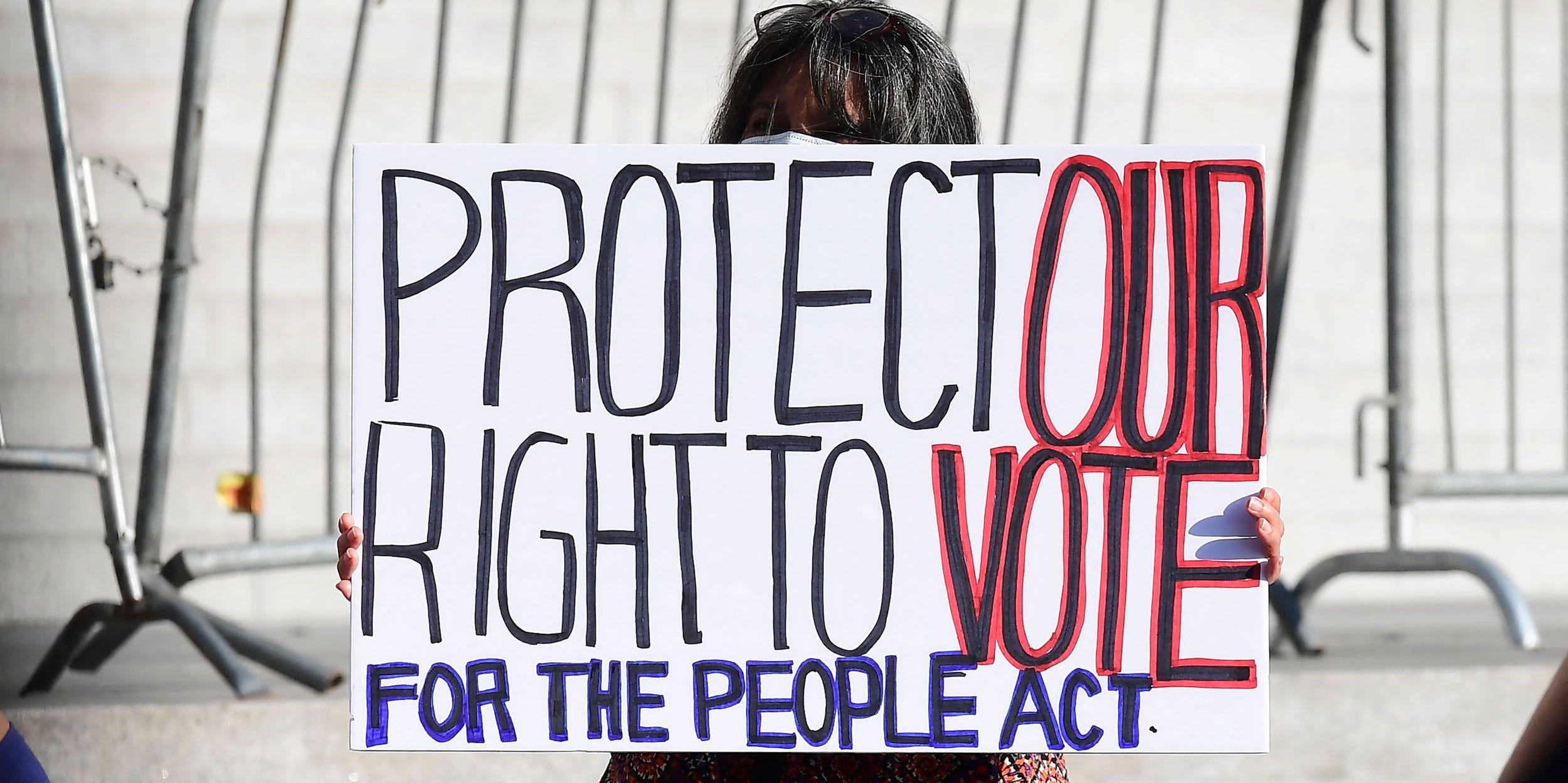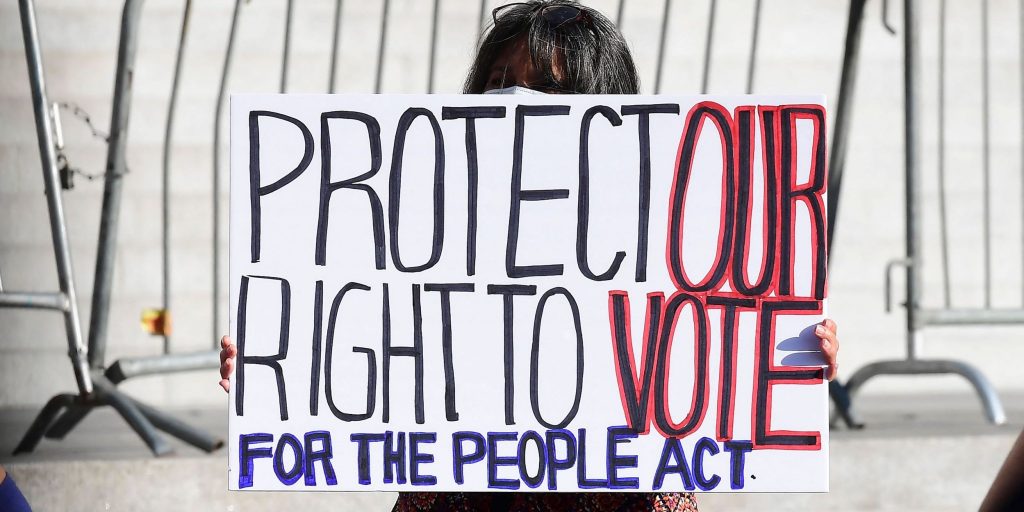
Frederic Brown/AFP/Getty Images
- The Supreme Court ruled in favor of Arizona's law that makes it harder to vote.
- Congress has stalled out on advancing legislation to protect voting rights.
- But while the fight for voting rights may have died on the federal level, there is still hope to drive out people and protect voting at the state level.
- Michael Gordon is a longtime Democratic strategist, a former spokesman for the Justice Department, and the principal for the strategic-communications firm Group Gordon.
- This is an opinion column. The thoughts expressed are those of the author.
- See more stories on Insider's business page.
Earlier this month, the Supreme Court signed the death certificate for voting rights. In a 6-3 decision along ideological lines, the Court decided that Arizona could implement restrictions that hamper the ability of Black and brown voters to cast their ballot.
In essence, more than 50 years after the Voting Rights Act became law, the federal protections against racially discriminatory voting policies have been stripped away. The conservative majority on the Supreme Court has given new energy to right wing states that want to keep minority voters away from the polls.
Democrats have the Supreme Court and red states against them. So their only choice left is to go local – and out-organize anyone standing in their way.
The big lie on steroids
While Republican-controlled states have passed onerous voting laws for years, the recent spate of voter suppression tactics all stem from former President Donald Trump's "Big Lie." The fact that President Joe Biden won the reliably Republican states of Georgia and Arizona sent a shockwave through the GOP. We all know, and perhaps expected, Trump to falsely claim that there was voter "fraud" after his 2020 loss. But now Republicans are falling all over themselves to please the former President by enacting laws to prevent these nonexistent "irregularities" from happening again.
Arizona, where the Supreme Court case originated, prevents friends and neighbors from helping someone turn in absentee ballots. It also allows the state to disqualify voters who accidentally vote in the wrong precinct. Republicans claim they are trying to prevent fraud, but the actual intention is clear when you recognize that local GOP officials routinely shift voting locations in minority neighborhoods – making it easier for these voters to accidentally run afoul of the new law.
Georgia's new laws, the cause of much outcry earlier this year, not only tighten voter ID requirements - a dog whistle for preventing Black folks from voting - but also make it a crime to pass out water to voters in line. Considering there are generally longer lines where Black voters vote, the water bottle law is designed to force Black voters out of line before making it to the front.
These laws aren't just in swing states, either. States like Arkansas, Alabama, and Oklahoma have all passed laws making it harder to vote by mail, on top of many other voting restrictions. This is an epidemic, and Democrats must use every means at their disposal to fight back before it's too late.
Filibustering the filibuster
The conventional wisdom is that the Democrats' most effective response to voter suppression is to pass a new federal voter protection law. Indeed, some of the very first bills put forth in the US House and Senate this year were to protect voting rights, like the John Lewis Voting Rights Act. The bills have not seen much success because of Republican intransigence.
The most common solution to move past the GOP is changing the filibuster, which prevents any bill from moving forward in the Senate unless it has 60 supporters. Given the 50-50 split in the chamber, this effectively gives the Republican minority veto power over almost every bill brought to the Senate floor.
After the Supreme Court decision, Democrats are calling again for an end to the filibuster so that the voting rights law can pass. But that ship has sailed. The Democrats in the ideological center of the Senate, Joe Manchin and Kyrsten Sinema, have not moved on changing the filibuster. And with their stubbornness on the filibuster goes any chance of a new federal voting law.
Democrats across the country need to stop hoping that Congress or the courts will fix this problem. They won't. Democrats need to take charge themselves.
Voter suppression boomerang
While efforts may be stymied at the federal level, Democrats do have a chance to harness the energy and outrage around voter suppression to increase voter turnout at the state and local level.
To start, they need to let Black, brown, and younger voters know that Republicans are trying to prevent them from voting, and inform them of how to stay on top of their right to vote. Major Democratic Super PACs are already investing in this kind of work, but more funds and more people will be necessary to make a real difference.
In Arizona, where casting a ballot in the wrong place can lead to disqualification, voter education campaigns are essential. The GOP technique only works to suppress the vote when voters don't know their polling location. With solid organizing, Democrats can ensure every single voter knows where to cast their ballot.
In Georgia, ground zero for many false claims of election fraud, Democrats have already shown what it takes to fight back. Stacey Abrams' Fair Fight has been on the front lines of combating voter suppression. As a result, Georgia Democrats helped flip the White House and Senate in 2020. If Democrats are serious about combating voter suppression, they should set up a Fair Fight in every single state.
Perhaps the single largest step that Democrats can take to fight suppression and increase turnout is to invest in year-round organizing. In too many places, young Democratic staffers parachute in for one campaign cycle and then leave, forgoing the ability to forge the deep connections it takes to win over and help voters.
The chair of the Wisconsin Democrats credits year-round organizing for the slim wins in both Wisconsin and Georgia, and the Democratic state party in Texas is already investing in this. It gets results. Texas Democrats managed to defeat an earlier attempt to pass draconian voter suppression laws, although the governor is still trying.
For the time being, Democrats can't do anything about the Supreme Court. But the right to vote is precious, and we can use the threat of these new laws to inspire people to hold onto what's theirs and fight back against Republican attempts to subvert democracy.
